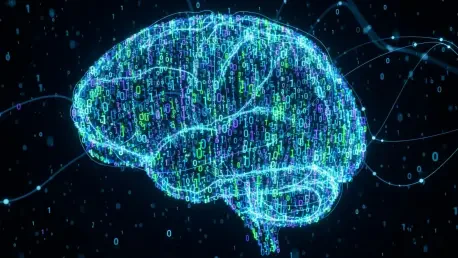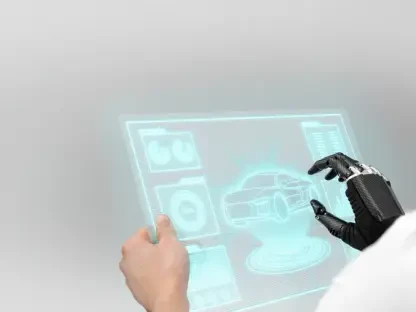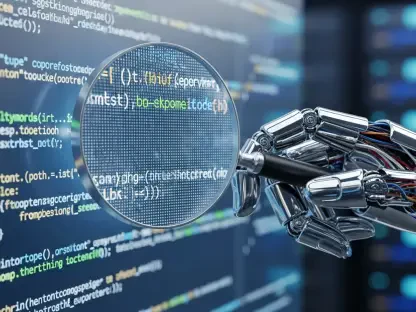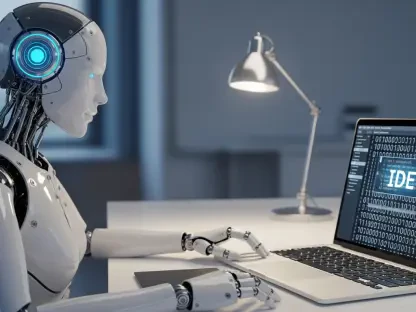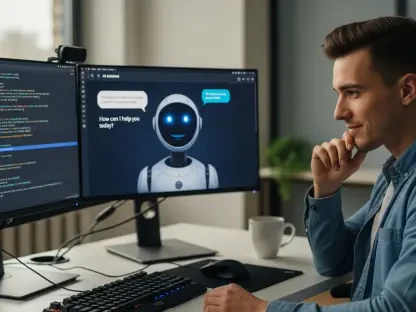Introduction to AI’s Transformative Role in Software Engineering
In 2025, the software engineering landscape is undergoing a profound transformation, driven by artificial intelligence (AI) with unprecedented speed and scale, reshaping the way technology is developed. At the forefront of this revolution is Anthropic, a leading AI research company, where AI tools are not just assisting but fundamentally altering how code is written and projects are delivered. Reports indicate that AI now generates a staggering 90% of code for many teams within the company, raising critical questions about the future of human engineers in tech. This seismic shift, spotlighted during high-profile industry discussions at events like the Dreamforce conference, sets the stage for an in-depth exploration of how AI is reshaping roles, challenging traditional workflows, and redefining skill sets in software development.
The momentum behind AI adoption extends far beyond a single organization, reflecting a broader industry trend that is both exhilarating and unsettling. As companies race to integrate tools like Anthropic’s Claude AI into their development pipelines, the balance between automation and human ingenuity hangs in a delicate equilibrium. This report delves into the specifics of AI’s impact at Anthropic, examines industry-wide patterns, and considers the implications for the workforce, regulatory frameworks, and the future of software engineering as a profession.
The Rise of AI in Software Development
Anthropic stands as a pioneer in leveraging AI to revolutionize software development, pushing boundaries with innovative tools that redefine productivity. The company’s flagship AI model, Claude, has become a cornerstone for many development teams, automating vast portions of coding tasks and setting a benchmark for what AI can achieve in tech. This leadership position highlights Anthropic’s role as a catalyst for change, inspiring both startups and established firms to explore AI-driven development with renewed vigor.
Industry events like Dreamforce have amplified the conversation around AI’s growing influence, showcasing real-world applications and success stories. Discussions between industry leaders reveal a consensus that AI is no longer a futuristic concept but a present-day tool reshaping workflows. Anthropic’s advancements with Claude are often cited as a prime example of how AI can streamline processes, reduce time-to-market, and enhance output quality across the tech ecosystem.
The adoption of AI in software development is not confined to niche players; it spans a wide spectrum of organizations eager to capitalize on efficiency gains. From small-scale innovators to global tech giants, the integration of AI tools signals a paradigm shift, where traditional coding practices are increasingly augmented by intelligent systems. This widespread embrace underscores the urgency for the industry to adapt, innovate, and address the challenges that accompany such rapid technological advancement.
AI’s Impact on Coding at Anthropic
Automation and Productivity Gains
At Anthropic, the integration of Claude AI into coding processes has yielded remarkable results, with the tool reportedly writing around 90% of the code for numerous teams. This statistic, shared by the company’s CEO during a prominent industry dialogue, illustrates the sheer scale of automation now possible. Such capabilities have transformed routine tasks into seamless operations, freeing up valuable time for engineers to tackle more nuanced challenges.
This automation translates into significant productivity boosts, enabling engineers to focus on the critical 10% of tasks that demand human creativity and problem-solving skills. Activities like editing code, designing complex architectures, and refining AI outputs have become central to the role of developers at Anthropic. The result is a workforce that can achieve outputs at a scale previously unimaginable, amplifying individual contributions through AI collaboration.
Far from diminishing the need for human talent, this shift suggests a rebalancing of responsibilities within development teams. Engineers are now positioned as overseers and innovators, guiding AI tools to ensure accuracy and relevance in outputs. This dynamic partnership between human expertise and machine efficiency is setting a new standard for what productivity means in software engineering at Anthropic.
Industry-Wide Adoption and Statistics
Beyond Anthropic, the reliance on AI for coding is gaining traction across the tech landscape, with compelling data underscoring its reach. A report from Y Combinator indicates that approximately 25% of founders in their current batch generate up to 95% of their code using AI tools. This figure points to a growing acceptance of automation as a core component of development, especially among emerging companies hungry for speed and scalability.
This trend is not limited to startups; established enterprises are also weaving AI into their software development frameworks, recognizing the competitive edge it provides. The ability to produce high volumes of code quickly and accurately is reshaping project timelines and resource allocation in boardrooms and coding labs alike. As AI tools become more accessible, their adoption is poised to accelerate, further embedding automation into the fabric of the industry.
The broader implications of this shift are profound, signaling a fundamental change in how software is conceptualized and created. Companies adopting AI at this scale are not merely optimizing processes; they are redefining the very nature of development work. This widespread transformation suggests that AI-driven coding is no longer an experiment but a cornerstone of modern tech strategy.
Challenges for Entry-Level Engineers
The rise of AI in software development, while a boon for efficiency, casts a shadow over the prospects of entry-level engineers entering the field. With tools capable of handling substantial coding workloads, the demand for junior developers to perform routine tasks is diminishing. This creates a bottleneck for young professionals seeking to gain hands-on experience and build their careers in tech.
Recent studies paint a stark picture of this challenge, revealing a nearly 20% decline in employment for developers aged 22 to 25 over the past few years since AI tools became mainstream. This data suggests that automation is disproportionately affecting less experienced workers, who often rely on entry-level roles to hone their skills. The ripple effect could disrupt the talent pipeline, leaving the industry grappling with a shortage of seasoned professionals in the long term.
For aspiring engineers, the path forward requires adapting to a landscape where foundational coding tasks are increasingly handled by AI. This reality necessitates a shift in focus toward skills like AI model supervision, system integration, and creative problem-solving. Without proactive measures to address this displacement, the tech sector risks alienating a generation of talent critical to its future innovation.
The Regulatory and Ethical Landscape of AI in Coding
As AI becomes deeply integrated into software development, the absence of specific regulations governing its use raises important questions about oversight and accountability. Currently, no tailored frameworks exist to address the unique challenges posed by AI in coding, such as workforce displacement or the ethical implications of automated decision-making. This regulatory gap leaves room for potential misuse or unintended consequences in deployment.
Broader compliance with data security and privacy standards offers some guardrails, shaping how AI tools are developed and implemented in tech practices. Companies like Anthropic must navigate these existing laws to ensure that AI systems handle sensitive information responsibly. However, these measures do not fully address the nuances of AI’s impact on employment or the integrity of automated outputs, highlighting the need for more targeted policies.
Looking ahead, the call for ethical guidelines and regulatory frameworks is growing louder, with stakeholders advocating for a balance between innovation and protection. Future oversight might focus on mitigating job losses while ensuring AI tools are used transparently and fairly in development processes. Crafting such policies will be crucial to fostering trust and sustainability in AI’s role within the software engineering domain.
Future Outlook for Software Engineering Roles
The trajectory of AI in software engineering points to a continued reshaping of roles, with an emphasis on evolving skill sets to complement automated systems. As tools like Claude advance, the demand for seasoned engineers capable of overseeing complex projects and refining AI outputs is likely to grow. This trend suggests a future where expertise in human-AI collaboration becomes a prized asset in the tech workforce.
Emerging advancements in AI capabilities could further disrupt traditional development models, introducing new tools that push automation boundaries even further. Economic factors, such as investment in AI infrastructure, will also play a pivotal role in determining how quickly and widely these changes unfold. Companies like Anthropic are well-positioned to lead this charge, driving innovation while scaling operations through intelligent systems.
Opportunities abound for those who adapt, with AI opening doors to novel approaches in software creation and problem-solving. The synergy between human insight and machine precision promises to unlock new levels of efficiency and creativity in tech projects. As the industry navigates this transition, the focus will likely center on harnessing AI’s potential while cultivating a workforce equipped for the challenges of tomorrow.
Reflecting on AI’s Impact and Path Forward
Looking back, the exploration of AI’s role at Anthropic revealed a landscape transformed by automation, where tools like Claude redefined productivity and reshaped engineering responsibilities. The journey through industry trends, workforce challenges, and regulatory considerations painted a complex picture of progress tempered by caution. It became evident that while AI amplified efficiency, it also posed risks to entry-level talent, creating a duality that demanded attention.
Moving forward, the tech sector must prioritize strategies to balance innovation with inclusivity, ensuring that emerging engineers are not sidelined by automation. Initiatives such as upskilling programs, internships focused on AI collaboration, and mentorship opportunities could bridge the gap for younger professionals. These steps would help maintain a robust talent pipeline while leveraging AI’s benefits for broader industry growth.
Additionally, collaboration between policymakers, companies, and educational institutions emerged as a critical next step to address regulatory and ethical gaps. Developing frameworks that safeguard both innovation and employment could pave the way for sustainable AI integration. By focusing on these actionable measures, the industry can turn the challenges of today into the foundations of a more resilient and dynamic future in software engineering.
